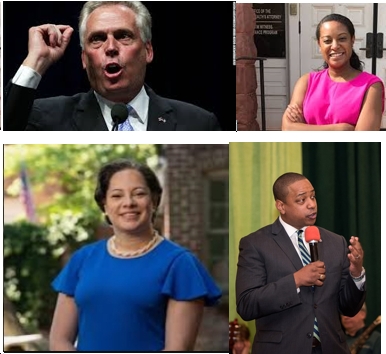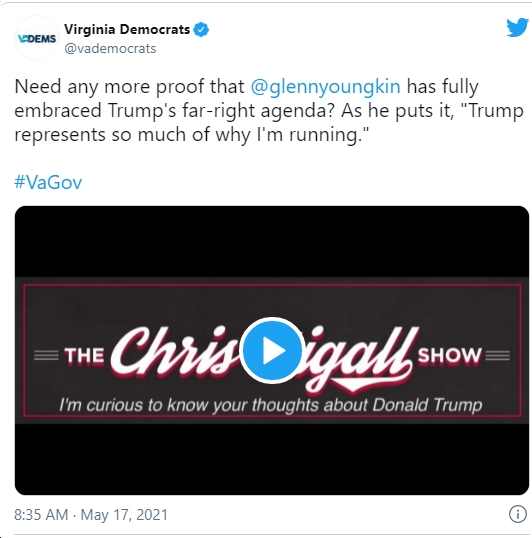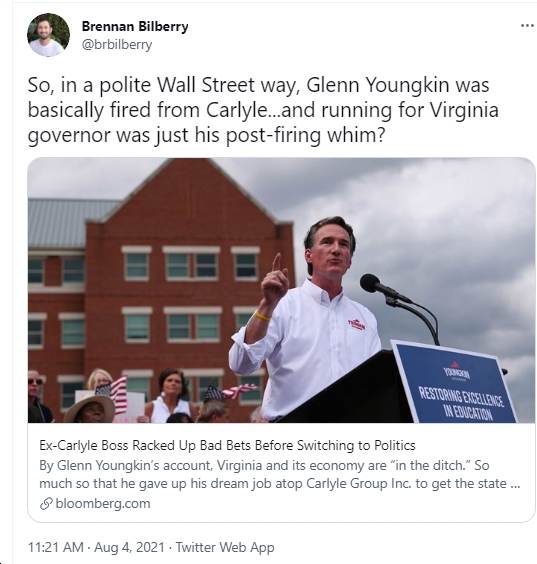IMHO, a lot of this by former Lt. Governor Bill Bolling (R) is wrong (including the spelling of Glenn Youngkin’s name, lol), but I’m posting it here because I think it’s useful to get the perspective of a VERY plugged-in Virginia conservative Republican politician on the state of the Virginia governor’s race. At the minimum, it give us a good indication as to how Bolling and his friends/allies in the party are thinking these days, with early voting for the June 8th Democratic primaries starting on April 23 – in just six weeks, and with Republicans STILL struggling to figure out how to nominate their statewide candidates on May 8. (Note: I’ll put a few comments of my own in parentheses/blue/bold)
THOUGHTS ON VIRGINIA’S GOVERNOR’S RACE
Many people have asked for my thoughts on Virginia’s upcoming gubernatorial campaign and who I am supporting. First of all, let me say that I’m not in the business of endorsing candidates these days, so I’ll pass on that one, but I will share my overall thoughts on the current status of the race.
On the Democratic side, I thought there would be more suspense than there has been. All the polls I have seen suggest that Terry McAuliffe will be the Democratic nominee in 2021. Make no mistake, McAuliffe will be a formidable adversary. He left office in 2018 with a favorable approval rating, he can raise unlimited amounts of money, and don’t forget, Virginia has voted Democratic in every statewide political campaign since 2009. (Nope, Rs haven’t won statewide since 2009, and it’s HIGHLY likely that Dems will continue that winning streak into year #12, as long as Democratic voters show up this November, of course!)
On the Republican side things are obviously less settled. As I see it, Republicans have three candidates who could potentially make a race of it in November, and each of these candidates have their relative strengths and weaknesses. Let’s consider them one by one, in alphabetical order.
KIRK COX – Kirk Cox has served in the House of Delegates for years, and is a former Speaker of the House. He is clearly the most qualified Republican to serve as Governor. Kirk also has a positive personal story, having been a public school teacher and coach. Kirk’s negatives are that he has cast a lot of votes over the years in the General Assembly, many of which could be used against him in a nominations battle (such as his support for Medicaid expansion in 2018), and in a general election. Nonetheless, Kirk is a strong candidate who could be competitive in a statewide campaign. (I’m not convinced that Cox would be a strong general election candidate, but I do agree that he COULD be competitive IF the economy’s a mess, Biden’s approval ratings plummet, Democrats are asleep at the switch, etc. Other than that, the problem is Cox is a super-boring, super-conservative/right-wing, older white guy. What’s the appeal of that to diverse, increasingly “blue” Virginia? Got me.)
PETE SNYDER – Pete Snyder is a good guy, who has worked hard within the Republican Party for several years. He was a successful Northern Virginia businessman, and could be viewed as a political outsider since he has never held public office. However, Pete did run unsuccessfully for Lieutenant Governor in 2013, and has some political baggage from that campaign that could be used against him in a general election campaign. He seems to have a loyal following within the Republican Party, and could be a popular first or second choice for many voters. I think he could also be a viable candidate in November. (Snyder’s basically a less qualified – e.g., he’s never held elective office, even MORE right-wingnut version of Cox. Again, what’s the appeal in a state won by Barack Obama, Hillary Clinton, Joe Biden, etc?)
GLEN YOUNGKIN – I must admit that I don’t know much about Glen Youngkin because he is a newcomer to Republican politics. That can be a strength, but it can also be a weakness. He is an unknown commodity. That means that he can create his own image, but no one actually knows how he would perform if elected. Nonetheless, he has a strong and impressive record of leadership in the private sector, and can reportedly finance his own campaign, which could make him a very viable general election candidate, especially running against Terry McAuliffe, who, as mentioned above, has unlimited fund raising potential. If people are looking for a true political outsider, they could find their candidate in Youngkin, but given his lack of political experience, he is a bit of a “pig in a poke.” (First of all, it’s Glenn with two “n”s in his first name, lol. Other than that, I agree that Youngkin *can* create his own image, and I’d be a lot more concerned if that image were more along the lines of Bob McDonnell’s “Bob’s for Jobs” message of 2009, without the super-hard-edged social issues stuff, and also the nutty “election fraud” conspiracy theorizing, etc. But sure, IF people are really looking for a “true political outsider,” then Youngkin’s more of one than Cox certainly, and also than Snyder, who has been heavily involved in VA GOP politics since 2012/2013, when he ran for LG and lost in a convention to EW Jackson…)
Bottom line, any of these three candidates could be a viable choice for Virginia Republicans, if they ever figure out how they actually want to nominate their candidate, but that’s another story altogether. (Tune in tonight at 7 pm for the VA GOP’s latest attempt to figure out something it took VA Dems about 10 minutes to settle months ago – how to nominate their 2021 statewide candidates. Should be entertaining…for Democrats, that is!)
So, I know everyone is asking, what about Amanda Chase? Is she not a viable candidate? Depending on the method of nomination, Chase could have been a viable contender for the Republican nomination. A primary would have definitely been good for Chase, but that’s not going to happen. Any other form of nomination is not good for Chase. (That’s not necessarily true, if Chase can bring thousands of her supporters to the convention. But yes, the overall point is correct, that Chase could win with a plurality, as would be the case in a primary without Ranked Choice Voting, but unlikely if she needs to get a majority of the vote, as would be the case in a convention.)
If by some miracle Chase did become the Republican nominee, she would be crushed in November. She is viewed as a political lightening rod. There are many Republicans who would not support Chase, and she would have no appeal to more moderate swing voters. If Chase is the nominee this will be a 60/40 win for the Democrats. Any of the other contenders discussed above could make it a race. (Yep, a 60/40 win for Dems with Chase as the nominee is quite possible, although I’d bet it would be closer to 57%-43% or whatever)
At the end of the day, McAuliffe will be the favorite going into the fall campaign. However, there could be an opening for Republicans if 1) they nominate a viable candidate, 2) circumstances between now and November break their way, and 3) this is a low voter turnout election. (I agree that the key is turnout…namely, will Democratic voters continue to show up in the types of numbers we saw in 2017-2020? Or will they drop off sharply? And also, will *Republican* voters show up now that Trump’s no longer president? Also, will Chase run as an independent/”Patriot Party” candidate?)
Well, those are my views. What do you think?


















